4861-19-2
| 中文名 | 尿素磷酸盐 |
|---|---|
| 英文名 | Urea phosphate |
| 中文别名 | 磷酸脲 |
| 英文别名 |
EINECS 225-464-3
CARBAMIDE PHOSPHATE MFCD00012602 Urea orthophosphate Harnstoffphosphat urea dihydrogenphosphate urea,acidic phosphate Urea PhosphateUP Urea-phosphoricacid urea trihydrophosphate |
| 沸点 | 158ºC at 760 mmHg |
|---|---|
| 熔点 | 116-118 °C (dec.)(lit.) |
| 分子式 | CH7N2O5P |
| 分子量 | 158.050 |
| 闪点 | 311.2ºC |
| 精确质量 | 158.009262 |
| PSA | 156.68000 |
| 储存条件 | 应贮存在阴凉、通风、干燥的库房中。 |
| 稳定性 | 易溶于水,其水溶液呈酸性,1%水溶液的pH值为1.89;不溶于醚类、甲苯、四氯化碳和二烷中。 失火时,可用水、砂土和二氧化碳灭火器扑救。 |
| 水溶解性 | 50 mg/mL |
| 计算化学 | 1.疏水参数计算参考值(XlogP):无 2.氢键供体数量:5 3.氢键受体数量:5 4.可旋转化学键数量:0 5.互变异构体数量:2 6.拓扑分子极性表面积147 7.重原子数量:9 8.表面电荷:0 9.复杂度:78.8 10.同位素原子数量:0 11.确定原子立构中心数量:0 12.不确定原子立构中心数量:0 13.确定化学键立构中心数量:0 14.不确定化学键立构中心数量:0 15.共价键单元数量:2 |
| 更多 | 1. 性状:无色透明棱柱状晶体。 2. 密度:不确定
3. 相对蒸汽密度(g/mL,空气=1):不确定 4. 熔点(ºC):117.3 5. 沸点(ºC):不确定 6. 沸点(ºC,25.5mmHg):不确定 7. 折射率(nD20):不确定 8. 闪点(ºC):不确定 9. 比旋光度(º, C=0.25, MeOH):不确定 10. 自燃点或引燃温度(ºC):不确定 11. 蒸气压(kPa,25ºC):不确定 12. 饱和蒸气压(kPa,60ºC):不确定 13. 燃烧热(KJ/mol):不确定 14. 临界温度(ºC):不确定 15. 临界压力(KPa):不确定 16. 油水(辛醇/水)分配系数的对数值:不确定 17. 爆炸上限(%,V/V):不确定 18. 爆炸下限(%,V/V):不确定 19. 溶解性:晶体易溶于水和乙醇,不溶于醚类、甲苯、四氯化碳等 |
|
Section 1. Chemical Product and Company Identification Urea Phosphate Common Name/ Trade Name Manufacturer Commercial Name(s) Synonym
Chemical Name Chemical Family Urea Phosphate Section 4. First Aid Measures Eye ContactCheck for and remove any contact lenses. In case of contact, immediately flush eyes with plenty of water for at least 15 minutes. Get medical attention if irritation occurs. Skin ContactWash with soap and water. Cover the irritated skin with an emollient. Get medical attention if irritation develops. Serious Skin ContactNot available. InhalationIf inhaled, remove to fresh air. If not breathing, give artificial respiration. If breathing is difficult, give oxygen. Get medical attention. Serious InhalationNot available. IngestionDo NOT induce vomiting unless directed to do so by medical personnel. Never give anything by mouth to an unconscious person. If large quantities of this material are swallowed, call a physician immediately. Loosen tight clothing such as a collar, tie, belt or waistband. Serious IngestionNot available. Section 5. Fire and Explosion Data Flammability of the Product May be combustible at high temperature. Auto-Ignition Temperature Not available. Flash PointsNot available. Flammable LimitsNot available. Products of CombustionThese products are carbon oxides (CO, CO2), nitrogen oxides (NO, NO2...), phosphates. Fire Hazards in Presence of Slightly flammable to flammable in presence of heat. Various Substances Explosion Hazards in Presence Risks of explosion of the product in presence of mechanical impact: Not available. Risks of explosion of the product in presence of static discharge: Not available. of Various Substances SMALL FIRE: Use DRY chemical powder. Fire Fighting Media and InstructionsLARGE FIRE: Use water spray, fog or foam. Do not use water jet. As with most organic solids, fire is possible at elevated temperatures Special Remarks on Fire Hazards Special Remarks on Explosion Fine dust dispersed in air in sufficient concentrations, and in the presence of an ignition source is a potential dust Hazardsexplosion hazard. Section 6. Accidental Release Measures Small SpillUse appropriate tools to put the spilled solid in a convenient waste disposal container. Finish cleaning by spreading water on the contaminated surface and dispose of according to local and regional authority requirements. Large SpillUse a shovel to put the material into a convenient waste disposal container. Finish cleaning by spreading water on the contaminated surface and allow to evacuate through the sanitary system. Urea Phosphate Section 7. Handling and Storage PrecautionsKeep away from heat. Keep away from sources of ignition. Ground all equipment containing material. Do not breathe dust. Keep away from incompatibles such as oxidizing agents. StorageKeep container tightly closed. Keep container in a cool, well-ventilated area. Section 8. Exposure Controls/Personal Protection Engineering ControlsUse process enclosures, local exhaust ventilation, or other engineering controls to keep airborne levels below recommended exposure limits. If user operations generate dust, fume or mist, use ventilation to keep exposure to airborne contaminants below the exposure limit. Personal Protection Safety glasses. Lab coat. Dust respirator. Be sure to use an approved/certified respirator or equivalent. Use a dust respirator if ventilation is inadequate and dust is visible. Gloves. Personal Protection in Case of Splash goggles. Full suit. Dust respirator. Boots. Gloves. A self contained breathing apparatus should be used a Large Spillto avoid inhalation of the product. Suggested protective clothing might not be sufficient; consult a specialist BEFORE handling this product. Exposure LimitsNot available. Section 9. Physical and Chemical Properties Physical state and appearance Solid. (Crystalline solid.)OdorNot available. TasteNot available. Molecular Weight158.05 g/mole ColorNot available. pH (1% soln/water)Not available. Boiling PointNot available. Melting Point116°C (240.8°F) Critical TemperatureNot available. Not available. Specific Gravity Vapor PressureNot applicable. Vapor DensityNot available. VolatilityNot available. Odor ThresholdNot available. Not available. Water/Oil Dist. Coeff. Ionicity (in Water)Not available. Not available. Dispersion Properties SolubilityNot available. Section 10. Stability and Reactivity Data StabilityThe product is stable. Not available. Instability Temperature Conditions of InstabilityExcess heat, incompatible materials, dust generation Incompatibility with variousReactive with oxidizing agents. substances CorrosivityNot available. Urea Phosphate Special Remarks onNot available. Reactivity Special Remarks onNot available. Corrosivity PolymerizationWill not occur. Section 11. Toxicological Information Routes of EntryInhalation. Ingestion. Toxicity to AnimalsLD50: Not available. LC50: Not available. Chronic Effects on Humans Not available. Other Toxic Effects onSlightly hazardous in case of skin contact (irritant), of ingestion, of inhalation. Humans Special Remarks onNot available. Toxicity to Animals Special Remarks on Not available. Chronic Effects on Humans Special Remarks on otherAcute Potential Health Effects: Toxic Effects on HumansSkin: May cause skin irritation. Eyes: Dust may cause eye irritation. Inhalation: Dust may cause respiratory tract irritation. Ingestion: Expected to be a low hazard for usual industrial handling. The toxicological properties of this substance have not been fully investigated. Section 12. Ecological Information EcotoxicityNot available. BOD5 and CODNot available. Products of BiodegradationPossibly hazardous short term degradation products are not likely. However, long term degradation products may arise. Toxicity of the ProductsThe product itself and its products of degradation are not toxic. of Biodegradation Special Remarks on theNot available. Products of Biodegradation Section 13. Disposal Considerations Waste DisposalWaste must be disposed of in accordance with federal, state and local environmental control regulations. Section 14. Transport Information DOT ClassificationNot a DOT controlled material (United States). IdentificationNot applicable. Not applicable. Special Provisions for Transport Urea Phosphate DOT (Pictograms) Section 15. Other Regulatory Information and Pictograms No products were found. Federal and State Regulations CaliforniaCalifornia prop. 65: This product contains the following ingredients for which the State of California has found to cause cancer which would require a warning under the statute: No products were found. Proposition 65 Warnings California prop. 65: This product contains the following ingredients for which the State of California has found to cause birth defects which would require a warning under the statute: No products were found. Other RegulationsNot available. WHMIS (Canada) Not controlled under WHMIS (Canada). Other Classifications DSCL (EEC)This product is not classified according S22- Do not breathe dust. to the EU regulations.S24/25- Avoid contact with skin and eyes. Health Hazard HMIS (U.S.A.)1 National Fire Protection 1 Flammability 1 Association (U.S.A.) Fire Hazard 1 0 Reactivity Health Reactivity 0 Specific hazard Personal Protection E WHMIS (Canada) (Pictograms) DSCL (Europe) (Pictograms) TDG (Canada) (Pictograms) ADR (Europe) (Pictograms) Protective Equipment Gloves. Lab coat. Dust respirator. Be sure to use an approved/certified respirator or equivalent. Urea Phosphate SECTION 16 - ADDITIONAL INFORMATION N/A |
|
生态学数据: 通常对水是不危害的,若无政府许可,勿将材料排入周围环境
|
| 符号 |

GHS05 |
|---|---|
| 信号词 | Danger |
| 危害声明 | H314 |
| 警示性声明 | P280-P305 + P351 + P338-P310 |
| 个人防护装备 | Eyeshields;Gloves;type N95 (US);type P1 (EN143) respirator filter |
| 危害码 (欧洲) | C |
| 风险声明 (欧洲) | 34 |
| 安全声明 (欧洲) | S22-S24/25 |
| 危险品运输编码 | UN 3261 8 / PGII |
| WGK德国 | 1 |
| 海关编码 | 3105590000 |
|
~% 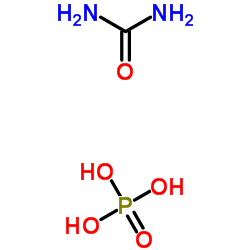
4861-19-2 |
| 文献:Matignon; Dode Bulletin de la Societe Chimique de France, 1934 , vol. <5> 1, p. 1118 Full Text Show Details Matignon; Dode; Langlade Comptes Rendus Hebdomadaires des Seances de l'Academie des Sciences, 1932 , vol. 194, p. 1289 |
|
~% 
4861-19-2 |
| 文献:Cochet; Houdin Comptes Rendus Hebdomadaires des Seances de l'Academie des Sciences, 1932 , vol. 195, p. 326 |
| 海关编码 | 3105590000 |
|---|


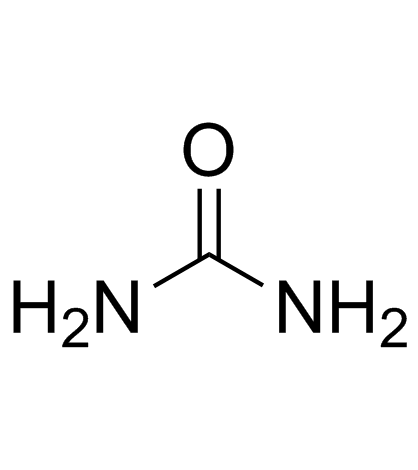
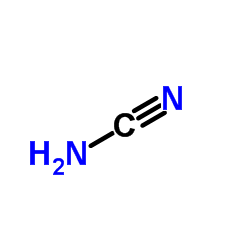
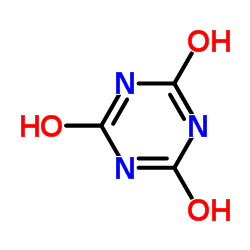

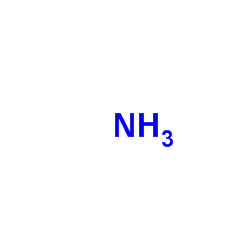
 真空浓缩一步法 将含25%P2O5的稀磷酸(含6%杂质)用烧碱预处理并倾析以除去氟硅酸钠,然后将其加到有熔融尿素的间歇反应槽内,配料比为21g尿素对100g磷酸溶液。在此条件下,磷酸脲完全溶解,然后将稀溶液预热,再进入真空浓缩器(P<13.3×100 Pa)于60℃进行浓缩。然后送到结晶器中冷却至20℃析出结晶。料浆在母液澄清槽中倾析,产品经少量水洗涤、干燥,制得磷酸脲成品。
真空浓缩一步法 将含25%P2O5的稀磷酸(含6%杂质)用烧碱预处理并倾析以除去氟硅酸钠,然后将其加到有熔融尿素的间歇反应槽内,配料比为21g尿素对100g磷酸溶液。在此条件下,磷酸脲完全溶解,然后将稀溶液预热,再进入真空浓缩器(P<13.3×100 Pa)于60℃进行浓缩。然后送到结晶器中冷却至20℃析出结晶。料浆在母液澄清槽中倾析,产品经少量水洗涤、干燥,制得磷酸脲成品。
